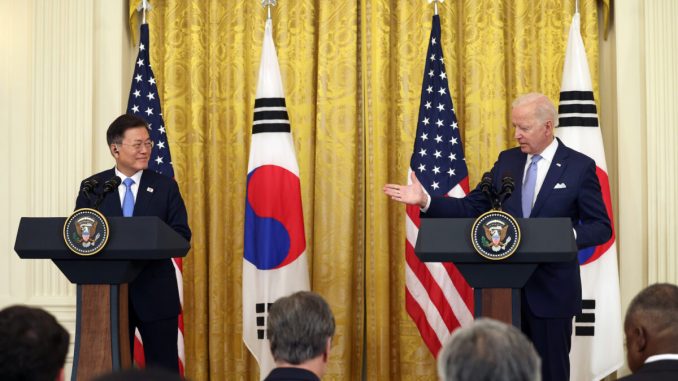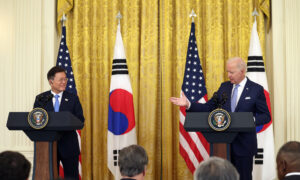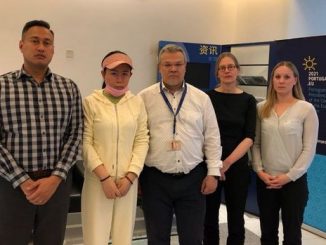

South Korean foreign minister Chung Eui-yong reiterated the importance of maintaining peace and stability across the Taiwan Strait following President Moon Jae-in’s visit to the United States.
On May 24, Chung told KBS TV in an interview that “It is only a fact that peace and stability in the Taiwan Strait is very crucial for peace and stability in the region,” according to Yonhap News Agency. He said such a fact was expressed in the joint summit statement issued by the United States and the Republic of Korea (ROK), though much in generalities.
Chung also juxtaposed the Korean Peninsula and Taiwan issues, stating that both required peaceful settlement, hoping China would understand the ROK’s stance on Taiwan.
His remarks were deemed a response to Beijing’s reaction to the U.S.-ROK joint statement.
Chinese Ambassador to the ROK, Xing Haiming, expressed his disapproval on May 24, claiming that China is aware that part of the statement is targeted at Beijing as it touches on sensitive issues involving the Taiwan Strait and the South China Sea.
Later, Chinese Foreign Ministry spokesperson Zhao Lijian expressed concerns on the content of the summit statement, stating Beijing “brooks no foreign interference” on the Taiwan issue.
President Moon Jae-in paid a three-day visit to the United States from May 21 and met Joe Biden, marking the second visit of a head of state to the White House, after Japanese Prime Minister Yoshihide Suga in April. Both leaders reaffirmed their commitment to the alliance between the two countries.
At the joint press conference, Biden described the 70-year alliance between the U.S.-ROK as essential for the future of the Indo-Pacific region and the world.
When it came to the issue of Taiwan, both the leaders highlighted the importance of preserving peace and stability across the Taiwan Strait in the joint summit statement, the first time that Taiwan has been included in such declarations.
When asked, Moon said Biden did not pressure him to take a tougher stance on China’s posturing toward Taiwan. “But as for peace and stability in the Taiwan Strait, we agreed how important that region is. Especially considering the special characteristics between China and Taiwan, we decided to work more closely on this matter going forward,” Moon said.
Though freedom of navigation and human rights were mentioned, China was hinted at but not called out.
Data shows that South Korea’s economy is heavily dependent on China. In 2019, the East Asian country exported goods worth over $136 billion to China, accounting for a quarter of its total exports, according to Chung Min Lee, a senior fellow in Carnegie’s Asia Program and an expert on Korean and Northeast Asian security.
However, he noted South Koreans are increasingly repulsed by China’s extreme nationalism and its imposition of the national security law on Hong Kong. Three-quarters of South Koreans have a negative view of China, compared to less than a third back in 2002, he added.
As of May 3, data shows President Moon Jae-in’s approval rating hit a record low of 33 percent since he took office in 2017, according to the Seoul-based Korean Times.
Caden Pearson contributed to this report.






Be the first to comment